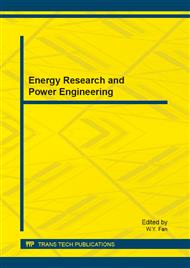[1]
Wu F, Wang J, Chen W, et al. A study on emission performance of a diesel engine fueled with five typical methyl ester biodiesels [J]. Atmospheric Environment, 2009, 43(7): 1481-1485.
DOI: 10.1016/j.atmosenv.2008.12.007
Google Scholar
[2]
Randazzo M L, Sodré J R. Cold start and fuel consumption of a vehicle fuelled with blends of diesel oil–soybean biodiesel–ethanol [J]. Fuel, 2011, 90(11): 3291-3294.
DOI: 10.1016/j.fuel.2011.06.058
Google Scholar
[3]
Kanitkar A, Balasubramanian S, Lima M, et al. A critical comparison of methyl and ethyl esters production from soybean and rice bran oil in the presence of microwaves [J]. Bioresource Technology, 2011, 102(17): 7896-7902.
DOI: 10.1016/j.biortech.2011.05.091
Google Scholar
[4]
Ayhan D. Importance of biodiesel as transportation fuel [J]. Energy Policy, 2007, 35(9): 4661-4670.
DOI: 10.1016/j.enpol.2007.04.003
Google Scholar
[5]
Gokalp B, Buyukkaya E, Soyhan H S. Performance and emissions of a diesel tractor engine fueled with marine diesel and soybean methyl ester [J]. Biomass and Bioenergy, 2011, 35 (8): 3575-3583.
DOI: 10.1016/j.biombioe.2011.05.015
Google Scholar
[6]
Kyunghyun R. The characteristics of performance and exhaust emissions of a diesel engine using a biodiesel with antioxidants [J]. Bioresource Technology, 2010, 101(1, Supplement): S78-S82.
DOI: 10.1016/j.biortech.2009.05.034
Google Scholar
[7]
Bueno A V, Velásquez J A, Milanez L F. Heat release and engine performance effects of soybean oil ethyl ester blending into diesel fuel [J]. Energy, 2011, 36(6): 3907-3916.
DOI: 10.1016/j.energy.2010.07.030
Google Scholar
[8]
Fontaras G, Karavalakis G, Kousoulidou M, et al. Effects of biodiesel on passenger car fuel consumption, regulated and non-regulated pollutant emissions over legislated and real-world driving cycles [J]. Fuel, 2009, 88(9): 1608-1617.
DOI: 10.1016/j.fuel.2009.02.011
Google Scholar
[9]
Puhan S, Vedaraman N, Sankaranarayanan G, et al. Performance and emission study of Mahua oil (madhuca indica oil) ethyl ester in a 4-stroke natural aspirated direct injection diesel engine [J]. Renewable Energy, 2005, 30(8): 1269-1278.
DOI: 10.1016/j.renene.2004.09.010
Google Scholar
[10]
Usta N. An experimental study on performance and exhaust emissions of a diesel engine fuelled with tobacco seed oil methyl ester [J]. Energy Conversion and Management, 2005, 46 (15): 2373-2386.
DOI: 10.1016/j.enconman.2004.12.002
Google Scholar


